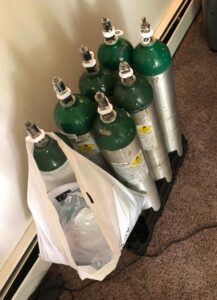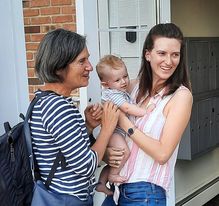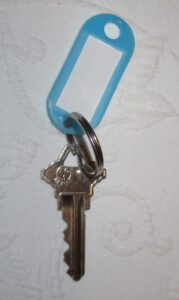Although Nelson came home from the hospital yesterday, by 6:45 AM today we were leaving home to go back to “Pill Hill,” which is what the locals call the massive Mayo Clinic campus.
First-up for Nelson was a blood draw— only two tries today, which is the limit for each tech. After that, they have to call someone else to try.
The blood draw was to help doctors closely monitor Nelson‘s clot, along with his levels of blood thinner. And these must be balanced with his fluctuating platelet count.
At our second appointment, this one with an oncologist, we learned that if the platelets in his blood continue to drop, the blood thinner must be decreased. Today that happened, since his new count, which had been 55 yesterday, was down to 42. This was disappointing, since dissolving the clot will now take longer.
The doctor lowered Nelson‘s blood thinner from 10 mg twice daily to 2.5 twice, quite a drop, thanks to chemotherapy doing it’s dirty work.
She spent a while examining Nelson and listening to his comments about how he was feeling. The mouth soreness, which has twisted Nelson‘s sense of taste, has become a film, a coating that makes food taste like sawdust (Nelson’s words). She said this will lessen with time, and we hope that’s true.
She told us to wrap Nelson‘s legs more firmly, noting the swelling of his limbs, which is worse than ever. Blood flowing into his arm and hand , she said, can’t freely return past the clot, causing swelling. The legs, she thinks, are a different problem. Veins are leaking fluid that’s been separated from blood flow (thanks to the cancer), which accumulates at the lowest point.
Nelson‘s third appointment was with pulmonology. His doctor and his assistant drained the left lung through its new catheter, 550 milliliters since yesterday. “You’ll have to drain it daily like the other side,” he said.
The right lung had virtually no fluid in it, which is why Ann Sophie couldn’t get it to drain last night. Doing that lung now will be just on alternate days.
 As the doctor did an ultrasound, he showed us small pockets or fissures filled with fluid that only a special drug could “get.” But since that process involves being off blood thinners for 48 hours, he felt it was too risky to use it right now.
As the doctor did an ultrasound, he showed us small pockets or fissures filled with fluid that only a special drug could “get.” But since that process involves being off blood thinners for 48 hours, he felt it was too risky to use it right now.
Our next stop was in the cardiology department where Nelson had another echocardiogram, an imaging test that sees how the heart chambers and valves are working. When the tech suddenly left the room telling Nelson she needed a signature to continue, he pictured himself leaving the exam room on a stretcher and heading back to the hospital.
He said he prayed harder than he ever had that God wouldn’t let that happen —and God didn’t. It turned out the tech had seen some unusual things on her screen, but when she looked at the rest of Nelson‘s record, she understood. Abnormalities are his norm.
From there it was off to one of the Clinic pharmacies to pick up seven prescriptions. Everything was ready.
Halfway through our busy day, Nelson and I shared a brief
lunch in the hospital cafeteria. He was plagued by nausea throughout the meal, scanning the area for an appropriate place to run, if needed. Eventually it passed.
 As we headed home at last, chemo’s misery came with us. Soon after we got there, he was vomiting. When it was over, his oxygen helped, and he quickly settled into his lazy boy and fell into a deep sleep.
As we headed home at last, chemo’s misery came with us. Soon after we got there, he was vomiting. When it was over, his oxygen helped, and he quickly settled into his lazy boy and fell into a deep sleep.
 It had been quite a day, made worse by chemo dogging our steps. But at 7 PM, something grand happened. Ann Sophie‘s mom arrived to our apartment, all the way from Germany! It was love at first sight for Oma and little Will— something chemo could not snatch from us.
It had been quite a day, made worse by chemo dogging our steps. But at 7 PM, something grand happened. Ann Sophie‘s mom arrived to our apartment, all the way from Germany! It was love at first sight for Oma and little Will— something chemo could not snatch from us.
“Let us run with perseverance the race marked out for us…” (Hebrews 12:1)


